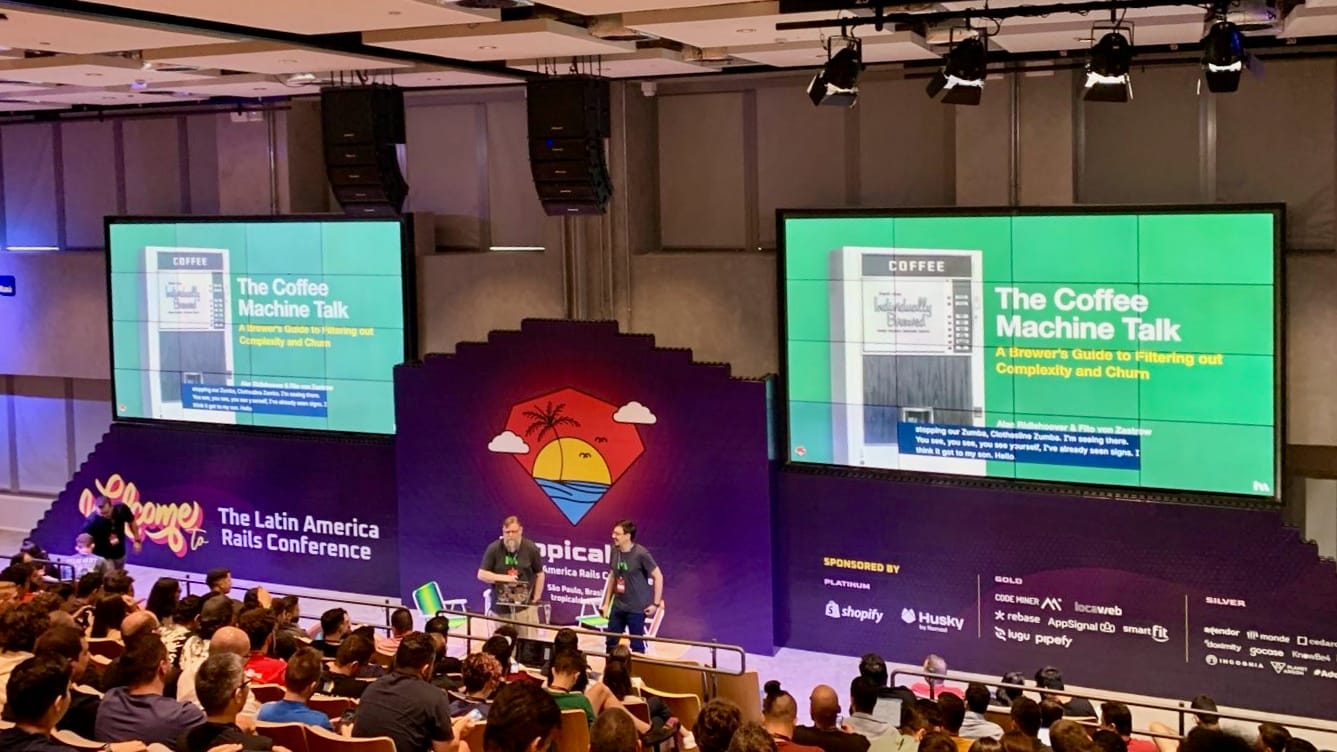I get the jitters before speaking. There's a nervous energy leading up to the event. It's almost like a mild sense of dread. It's actually a fear of the unknown:
- Will people show up?
- Will I goof up?
- Will my content be well received?
- Will my jokes land?
I don't sleep as much as I should. I also don't eat as well as I should. I go straight for comfort food — sugar, salt, and fat — triggering the reward center in my brain in an attempt to hold the (mild) dread at bay. Arriving at the event usually leads to an exaggeration of these symptoms: even more comfort food, even less sleep.
The jitters are the worst in the 10 minutes before I go on stage. My daughter has a word for it: nervecited. My body's internal energy level goes off the charts. It manifests in my hands. They tremble slightly. I use slow, deep breathing to try to keep it in check. It also REALLY helps to have someone to talk to just before going on stage. The conversation distracts me from what's about to happen.
Then, it's one last deep breath and I'm on the stage. The lighting for the video recording makes it almost impossible to see the audience, so I focus on the first few rows as I speak. Planting a friend or two up front also really helps with my nerves. Seeing their faces gives me confidence.
And, then I'm off! I like to start my presentations with a little story or vignette to grab the audience's attention and setup a structure upon which the rest of the talk can hang. I also like for there to be a couple of jokes early in the talk to show that I'm not taking myself too seriously. I really put a ton of pressure on myself to nail this opener. Maybe too much. So, I'm über sensitive to how it's going as I recite the words.
My internal monologue gets tunnel vision during the presentation.
- "You're looking down at your notes too much!"
- "You missed the inflection you wanted to put on that word!"
- "You're talking too fast!"
- "You're talking too slow!"
- "Oh, no! Your mouth is getting dry!"
But, then something happens. As I get further and further into the deck, all that recedes: the jitters, the trembling hands, and even the negative self-talk. All that's left is positive energy.
And, then it happens! I deliver my first joke... AND IT LANDS!!! From that point on, I know that I've got this. The internal monologue is still there. I can still hear it nit-picking. But I just think about the laughter and the voice slinks back into the shadows within my brain.
Before I know it, the talk is over, and the audience is applauding. At this point, I'm often uncertain how to act.
- Do I take a bow? (No!)
- Do I stand there on stage until the applause stops? (No!)
- Do I do that namaste thing and give a nod with my hands pressed together, then get off stage? (Yeah, that feels about right.)
Next come the questions. People rush the stage wanting clarification on some point you made or to share their own ideas (often in the same breath). But, every single one of them always starts with, "Great talk!" or, "This was amazing!" or, "Thank you!" I've even had people say to me, "That was the best talk I've seen at this conference!" and, "The first thing I'm going to do when I get back to work is to put this into action!"
Then that positive energy follows you around for the rest of the conference. You become a bit of celebrity. People seek you out. Not for your autograph, but to communicate their gratitude, congratulate you, and ask more questions. Honest to God, it's one of the best feelings on this Earth – to know that you connected with someone, that your message was received, and that it had an impact.
After that comes the social media afterglow. People posting photos of your slides online and offering their opinions. People liking the links to your deck and any other resources you might share. It can last a couple of weeks, allowing you to ride that conference high just a little longer.
Would I recommend it? 100%! Absolutely! Speaking publicly is almost as big a high as my wedding day or the arrival of my children! Just like those events, it's preceded with uncertainty and nervous energy. Just like those events, the moment itself is a blur. And, just like those events, there is an afterglow.
There are a few things I do that I would recommend, if you're interested in trying this yourself:
- Write your proposal early, even before a CFP. Focus on the thing you know best that applies to the largest possible audience. (Conference organizers are going to use your abstract to try to sell tickets. So it needs to appeal to as many people as possible.)
- Get feedback on your proposal before submitting it. Reach out to former speakers and program committee members. Reach out to me!
- Write an outline of your content. I use the three act play format from the book Beyond Bullet Points.
- In the first act, set the scene. Define the protagonist and what challenge they face. At the end of this introduction, there should be some tension, some unresolved problem to solve by the end of the talk.
- In the second act, tell the story. Develop the action. I try to have 3 main points. (People learn well in sets of three.) If I only have 5 minutes, I'll stop right there. But, if I have 15 minutes, I'll go into 3 subsections for each of the main points. If I have 45 minutes, I'll go one level deeper.
- In the third act, come to a resolution. This is your opportunity to tie all the content together and back to the unresolved problem at the beginning of the talk. The best talks I've seen do this so effortlessly, that the audience gets a real sense of resolution.
- Write your deck early — as in weeks before the conference. Don't procrastinate!
- Get feedback on your deck. Again, leverage former speakers. I'd be happy to take a look, as would every other speaker I know.
- REHEARSE! It's okay to start with virtual rehearsals. But, ultimately, if you're going to be on a stage with a live audience, you need to get at least one or two live rehearsals. (It's impossible to tell how a joke or salient point will land over a video conference with everyone on mute and off camera.)
- Solicit feedback after each rehearsal. These people are (literally) your audience. You're doing this for them. Make sure you give them what they want.
- Have fun! For all the jitters to be worth it, you've got to be having fun at every phase of the process.
Best of luck! I hope to hear what you have to say soon. And, seriously, let me know how I can help!


Member discussion